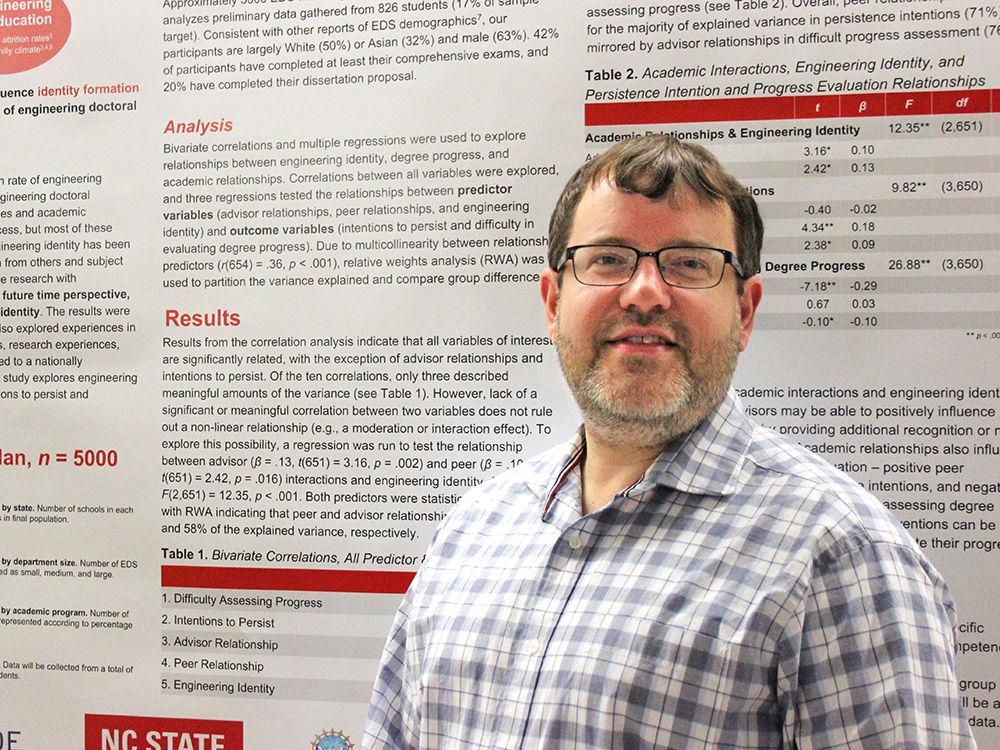
Amrita Malur
Psychology Ph.D. student, Matthew Bahnson, stands outside his office in Poe Hall on Thursday. Bahnson is working along with co-principal investigators Cheryl Cass and Mary Wyer to better understand perceived bias in engineering graduate programs across the country. Phase one of the research begins in 2018 and involves interviewing graduate students from around the country to better understand how they perceive bias in their graduate programs.
NC State researchers have created a three-year project to understand the impact of psychological barriers for engineering graduate students. They plan to reduce biased experiences in programs to increase persistence in engineering.
Matthew Bahnson, a first-year graduate student studying social and community psychology, is working alongside Cheryl Cass and Mary Wyer. Cass is the director of the materials science and engineering department, and Wyer is an associate professor of psychology. The team received a grant for the project through the National Science Foundation.
Bahnson credits fewer people starting and finishing STEM degrees as a motivation for the study, as well as the environment of campuses.
“I think a lot of people think the university environment is so welcoming and everybody’s fine and there’s no discrimination here,” Bahnson said. “Even at NC State, I’ve spoken to professors in engineering that are like, ‘Oh, that doesn’t happen here,’ and I’m like, well I think your students probably have a different experience.”
David Parish, assistant dean of engineering at NC State, hypothesizes that the sheer disparity in diverse populations contributes to students’ perceptions of bias.
“I would guess that if you were from the minority side of things in that classroom, you would maybe feel ostracized, but I don’t know, and I’m speaking from outside the student population, that the students themselves are ostracizing others,” Parish said.
Bahnson supposes that people don’t understand the impact of students’ experiences both inside and outside the classroom on their process of going through the program.
“What’s important is understanding that students’ perceptions are their reality,” Bahnson said. “When they perceive something as being biased, that’s how they feel about it. What we need to do as institutions is make sure that we have institutional accountability for reducing those experiences so that people aren’t leaving because of that.”
Claire Stewart, a first-year studying computer science, experiences the feeling of being a female in a male-concentrated atmosphere.
“I’m proud that I’m one of the few females that are actually in computer science,” Stewart said. “Sometimes computer science gets really hard, but I’ve just got to know to keep at it because I need to represent the women.”
The project is set to begin in July 2018 and consist of three different phases.
“The first phase will be about a year and be qualitative interviews with graduate engineering students who have multiple minority identities, so we can look at the intersections of those identities,” Bahnson said.
The second phase will be based off of a survey created from the first phase.
“We hope to have about 3,000 responses nationally of graduate engineering students just responding about experiences they have and how often they experience different types of bias within their program,” Bahnson said.
The last phase plans to follow up with those that participated in the interview from the beginning phase. To diversify the field of engineering, the project is focusing solely on graduate students.
“We’re talking about the next generation of faculty,” Bahnson said. “If we can help them persist to their degrees, then we can help with the diversification of engineering as a field which continues to be a problem.”
Parish provides perspective on the changes in engineering demographics since he studied in college.
“Years ago, it was all men,” Parish said. “That’s just what it was. Today, thank goodness, it’s more diverse, and we have better engineers because of that. It’s just a slow process and maybe because of that people are feeling that change.”